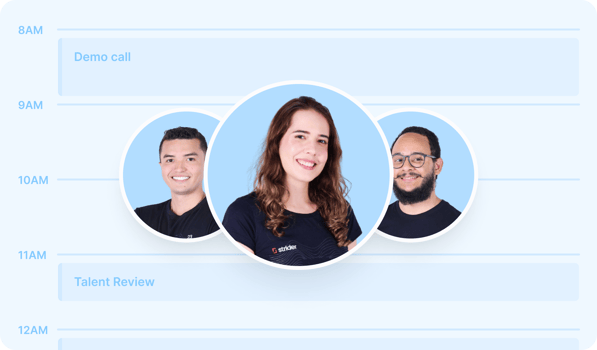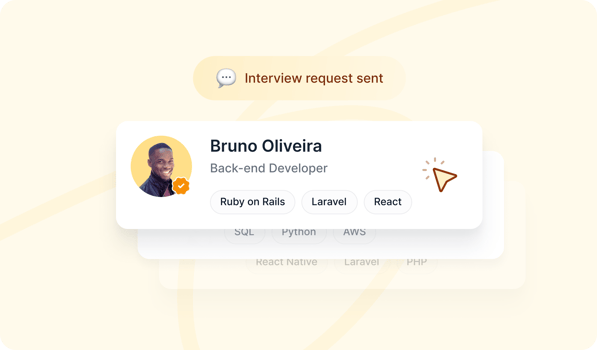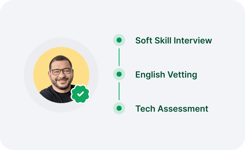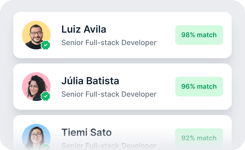Hire Remote R Developers
R is a software environment and a full-featured programming language that allows you to create objects, functions, and packages. It is a collection of software tools for statistical analysis and research. It uses a range of techniques, such as time series analysis, linear regression, and statistical inference, to name a few.
The majority of R libraries are made in the R language itself, whereas C, C++, and Fortran libraries are used for the more time-consuming and complex machine learning procedures.
Bioinformaticians, statisticians, and data miners use R to analyze data and create statistical tools. To increase the functionality of the R language, people have created packages. User surveys and analyses of scholarly literature databases indicate that R is currently one of the most popular programming languages in data mining.
In August 2020, R reached its peak position of eight on the TIOBE index, a measure of programming language popularity. The ranking of R as of December 2022 was 11. While down from its peak, it still has strong demand and a very large following.
What to look for when hiring R developers
To guarantee that any data analysis tasks, data science projects, or other web services you require them for are handled correctly, there are a few things you should look out for during the hiring process to ensure you hire the right R developer.
Technical skills
R developers must have a wide range of technical knowledge and skills, as well as experience, in order to excel at their positions. During the hiring process, try to look out for an R programmer with the following technical skills.
An R developer needs to be well-versed in numerous programming languages. In particular, they should be knowledgeable about the R programming language, as well as Python, C+, Java, Perl, and Ruby. They should be proficient in multivariable calculus, linear algebra, statistical calculations, data visualization, and machine learning techniques.
Communication skills
Communication skills are essential for R programmers. They must possess effective listening and speaking abilities. Software development is frequently a team effort, and R developers frequently work with many other experts. Effective communication skills are essential for developers to advance in their careers and keep good working relationships with everyone they work with.
Also, they must comprehend the information and subject matter of their works. This is impossible if they lack the right communication skills. To build a dedicated development team and establish good relationships with the team as well as other employees at your company, you should only hire R developers who are good communicators. This is essential for achievement in a professional or collaborative setting.
Effective listeners and communicators will be able to better understand your demands and ensure that they are met. Keep an eye out for R programmers who can conduct themselves professionally, speak with assurance, behave with respect, and have good listening skills while being vetted.
Machine learning abilities
In order to create useful data models and software applications, an expert R developer must be familiar with artificial intelligence and machine learning concepts. They must have a solid understanding of the machine learning (ML) techniques and libraries used to build intelligent applications and train models that turn unstructured data into informative data.
Knowledge of data wrangling
The idea of a flawless data set is a pipe dream. The truth is that virtually every data set contains flaws. Data wrangling is a process that helps to clean up faulty data sets. Before using the R language actually to analyze the data, it is essential that an R developer is familiar with the fundamentals of data wrangling.
Data visualization abilities
When hiring, consider looking for a developer with experience in data visualization, though it's not required. A non-technical audience can easily understand complex trends and analyses when data visualization tools like Tableau, Sisense, Qlikview, Ploty, etc. charts, graphs, histograms, and other visual aids are used. An R developer can cater to a wider range of clients inside a company by using data visualization tools.
A data-intuition mindset
To maximize ROI, the company may occasionally need to develop an entirely new procedure or alter an already existing one. R developers gain from having a strong data intuition because it helps them think creatively and develop original solutions.
Proficiency with statistical calculations
To be a successful R developer, your candidate must have statistical computation knowledge. Statistics and data analysis are two concepts that go hand in hand. R has more than 9100 packages at its disposal to manipulate data, but a developer needs to have a solid grasp of the statistical frameworks and calculations in order to understand the language's output.
Top 5 R developer Interview Questions
When in R should you use the "next" statement?
An R developer needs to be proficient in all things R-related and asking this question would allow you to gauge the knowledge level of your candidates.
To skip any leftover statements in the loop and carry on with the program's execution in R, use the “next” statement. It is a statement that skips the current iteration without ending the loop, to put it another way.
Similar to the “break” statement, "next" is a loop control statement. But the “next” statement, in contrast to the “break” statement, forces the loop to execute its subsequent iteration rather than terminating it.
How do you create and test a linear regression model in R?
Asking this question allows you to question the technical know-how of the developers. The basis for data manipulation and analysis in the R language is a linear regression model, or any model. The following could be the developer's response: The steps to create and assess a linear regression model are as follows:
- Enter the data into R
- Verify that the assumptions are met by your data.
- Carry out the analysis of linear regression
- Examine the homoscedasticity.
- Display the findings in a graph.
- Describe your findings.
What benefit does using the Apply family of functions feature offer?
Asking this question is crucial because it enables you to assess their expertise, as an experienced developer should have a solid understanding of the various tools and functions. With the help of this tool, developers can work with matrices, data frames, vectors, arrays, and more. Although they are faster and more effective than loops, these functions can be used in place of them.
Describe the R language's data import process.
By asking applicants about their understanding of the R language’s data import process, you may determine how skilled and informed they are.
R offers the ability to import data. For the R Commander Interface to start up, the user must type the commands in the command Rcmdr into the console. In R, data can be imported in three different ways, including
- In the dialog box, choose the data set, or, if necessary, type its name.
- Data->New Data Set in the R Commander editor is used to insert data directly. Only when the data set is not too big does this work well.
- Moreover, data can be imported from the clipboard, a URL, an ASCII plain text file, any statistical program, or a plain text file.
What Is the R Process for Listing Preloaded Datasets?
An experienced R developer should be familiar with all R processes, this shows their expertise and technical knowledge. Asking this question allows you to assess that.
The built-in MASS package, which includes datasets and functions, is where the preloaded R packages are located. You'll need to run the command data() to list these datasets. Following your decision on the dataset you will use, use the command data(*sample data set*) to choose your preferred dataset from the MASS package. The dataset's name is enclosed in parentheses.







